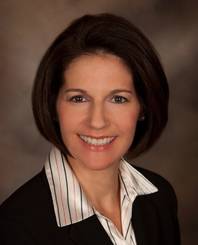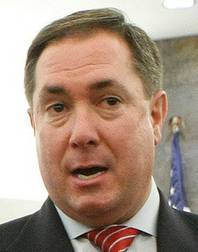
Las Vegas Justice of the Peace Melissa Saragosa presides over Domestic Violence court at the Regional Justice Court Thursday, June 2, 2011. The specialty court was created earlier this year to handle domestic violence cases.
Sunday, June 12, 2011 | 2 a.m.
Beyond the Sun
Sun coverage
Sun archives
- Coroner identifies man shot by police after domestic violence incident (5-31-2011)
- Metro Police officer arrested on domestic violence count (5-26-2011)
- Nevada’s mental health courts are in serious jeopardy (5-1-2011)
- Northeast valley neighborhood blocked off after domestic violence incident (4-25-2011)
- Former prostitute turns life around with court’s help (8-11-2010)
- Domestic violence workers find truth in Harry Reid’s jobless comments (2-23-2010)
- Judge’s divorce filing follows arrest of her husband, a lawyer (11-26-2009)
- Judge’s lawyer husband accused of domestic battery (10-2-2009)
- 2 women killed in domestic violence shootings identified (9-8-2009)
- Clark County Drug Court a catalyst to change lives (5-15-2009)
- Judge Halverson’s husband sentenced in frying pan attack (1-14-2009)
On this particular morning, 13 men and three women in jail garb gathered nervously inside the Regional Justice Center’s Courtroom 7D, some whispering questions to defense attorneys, others fidgeting with their handcuffs.
When Las Vegas Justice of the Peace Melissa Saragosa turned her attention to them after sorting through court records, the offenders stood up one by one, sheepishly offering no contest pleas to misdemeanor domestic violence battery charges.
Like clockwork, Saragosa gently admonished them to stay out of trouble and then issued sentences, typically: two days in Clark County Detention Center with credit for time served, a 90-day suspended sentence, $345 in fines, 48 hours of community service and most important, six months of counseling that costs offenders $850 but is available on a sliding fee scale based on ability to pay.
One offender didn’t get off as easy. He was given 10 more days in jail for contempt of court after failing to show up for scheduled counseling after claiming he went to Tijuana, Mexico, to look for a missing niece. “You do need to take this case seriously if you don’t want to spend six months in the Clark County Detention Center,” Saragosa told him.
It could be worse, though, because repeat offenders and others charged with felony domestic violence can get up to five years in prison.
Saragosa is on the cutting edge of a criminal justice strategy to curb one of Nevada’s biggest evils, the endless cycle of domestic violence.
Saragosa volunteered in January to preside over the state’s only court to specialize in domestic violence, cases that previously were spread among nine of her colleagues in Las Vegas Township Justice Court.
The court’s justices hope that having one specialize in these cases, with a focus on getting abusers the counseling they need, will have the same success other specialty courts in Nevada have had with substance abuse offenders or those with mental health issues.
Saragosa concedes it’s too early to tell whether her court will succeed in reducing recidivism, but she says it has been worth the effort, and she sees signs that offenders have been receptive to what she’s trying to accomplish.
“I have seen significant improvement in compliance by defendants,” Saragosa said last week. “I truly believe that if we are going to prevent recidivism in domestic violence cases, the court needs to reach out to them to put them in the best position to succeed.”
Because Justice Court has jurisdiction only over unincorporated portions of Clark County, cases of domestic violence that occur in Las Vegas, Henderson and North Las Vegas are handled by municipal judges in those cities. Still, the volume of domestic violence cases in Justice Court was enough to persuade the court to direct those cases through a single judge. As of mid-May, Saragosa had 2,078 pending misdemeanor cases and 805 pending felony cases.
Nevada had the nation’s highest rate of women murdered by men in 2008, the last year figures are available in cases involving a single murder victim and assailant. According to the Violence Policy Center, a nonprofit Washington advocacy group, Nevada’s 38 victims translates to a rate of 2.96 per 100,000 women, more than double the national average of 1.26 per capita.
“For courts to lower that statistic, we need to look at how we handle domestic violence,” Saragosa said. “Is there something we’re not doing that we should be doing to prevent repeat offenders?”

Catherine Cortez Masto

David Roger
The Violence Policy Center findings helped fuel passage this year of Senate Bill 66, legislation advocated by Nevada Attorney General Catherine Cortez Masto to establish expert panels to study domestic violence fatalities. Not surprisingly, Cortez Masto is a big fan of the domestic violence court.
“I have been working since 2003 on trying to get a domestic violence court in our state, ever since I was assistant county manager in Clark County,” she said. “I am very excited that Judge Saragosa and her court have done just that. By having a specialized court, you have a judge willing to work with the prosecutors and public defenders to assure that the batterer gets treatment and completes that treatment.”
Another supporter is Clark County District Attorney David Roger, whose office had a team of domestic violence prosecutors before the specialty court was established. Roger said having a single judge preside over domestic violence offenses means they will be given priority.
“There will also be more consistency when you have one judge,” Roger said.
The one-judge concept is endorsed by Maria Outcalt, spokeswoman for Safe Nest, a shelter for domestic violence victims.
“We think having one judge gives that judge the opportunity to see all the different types of domestic violence cases,” she said. “It will make the judge an expert in domestic violence.”
The Nevada Network Against Domestic Violence also endorses Saragosa’s court. But the network’s executive director, Sue Meuschke, said she hopes other courts don’t ignore domestic violence as a contributing factor to other crimes such as kidnapping.
“Knowing the volume of domestic violence cases, is one judge enough?” Meuschke said. “If this judge leaves, will there still be a commitment by the court to domestic violence? Will there be another judge who brings the same level of interest that (Saragosa) brings to the issue?”
However, Clark County Public Defender Phil Kohn wants to revert to the old system of distributing domestic violence cases to various justices. Kohn’s office defends individuals accused of felony domestic violence.
“No, I don’t think it’s working,” Kohn said of the domestic violence court. “I don’t see any purpose to it. There’s too many cases that everyone is trying to go through too fast, and there are too many cases for one courtroom. These are the most difficult misdemeanors we have.”
Most individuals who appear before Saragosa are first-time offenders, and most require court-appointed attorneys.
“From what I read in the police reports, there are some common things in these cases, arguments over money, arguments over infidelity, or it may be related to drugs,” she said.
Although she said she could not tell whether the rough economy was contributing to domestic violence, Saragosa said:
“Whenever there is financial stress in the home, they should have some form of consumer credit counseling or financial counseling. It is a very difficult time for many indigent defendants who are unemployed.”
Because a goal of the court is to get offenders help, it starts by giving them written instructions on what is expected of them. These instructions, also available in Spanish, warn them to stay out of trouble, attend counseling, participate in substance abuse programs and parenting classes, pay restitution, perform community service and refrain from drinking alcohol.
A separate document lists the available domestic violence treatment clinics in town, along with their locations and hours of operation so that all offenders can conveniently attend. The court also provides a hotline number offenders can call if they need help complying with Saragosa’s instructions. If they cannot email or fax evidence to the court that they have complied with their community service and counseling, offenders can drop off their paperwork in a lock box outside the courtroom.
“If you only give them information orally, they may have difficulty remembering it,” Saragosa said. “I have them sign documents so that they have ownership of the information. We have to try something different, and hopefully this will be helpful. It will take a year or more to look back on the impact we have had and whether it was helpful.”


Join the Discussion:
Check this out for a full explanation of our conversion to the LiveFyre commenting system and instructions on how to sign up for an account.
Full comments policy